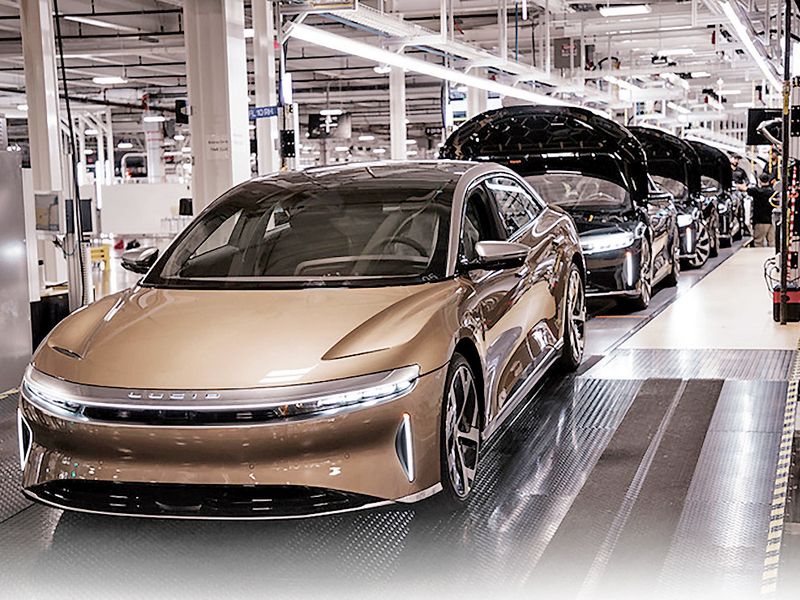
CASA GRANDE, Ariz. — In many ways, electric vehicle startup Lucid Motors, which began manufacturing luxury EVs here last week, is following in the footsteps of its successful rule-breaking competitor Tesla.
But former Tesla employees who are helping to launch Lucid say the new automaker is cutting its own path, including adopting more traditional industry processes to ensure quality and safety.
“It’s not always black and white,” said Eric Bach, a former Tesla engineer who now is Lucid’s chief engineer. Speaking during the production launch of the Lucid Air sedan last week at its new plant outside Phoenix, Bach said he has different views from his famous former boss, Elon Musk, about the processes of automaking.
“There are good processes, and there are maybe a couple of bad ones. So what did we do? We said, they’re not fundamentally bad. We want to use robust processes.”
To get up and running, Lucid adopted traditional industry practices in safety, vehicle development, plant processes and supply chain decisions.
Taking a more traditional path is one way Lucid plans to differentiate itself from Tesla as it ramps up production.
By comparison, Musk has been critical of what he has called the rigid processes that large automakers use, asserting that they often act as a “substitute for thinking,” impeding their employees’ creativity.
Some of Lucid’s top brass have experience at Tesla — including Bach, Lucid CEO Peter Rawlinson, who was the chief engineer of Tesla’s Model S, and manufacturing chief Peter Hochholdinger, a former Tesla production executive.
But Bach acknowledged that since joining Lucid in 2015, he has drawn on lessons he learned at Tesla, as well as in previous roles with Volkswagen AG. He said it will be important for Lucid to use all the tools it has to be nimble enough to adapt to a changing market.
“We’re in this transformative stage right now where you can’t just milk your 100-year-old technology like the old OEMs thought,” he said. “Now you need quicker processes, more innovative processes, transparent processes to let that innovation happen.”
Lucid’s approach stands out from Musk’s, who once declared that he does not “believe in process.”
“The problem is that at a lot of big companies, process becomes a substitute for thinking,” Musk once told Wired magazine. “You’re encouraged to behave like a little gear in a complex machine. Frankly, it allows you to keep people who aren’t that smart, who aren’t that creative.”
But Lucid’s leaders are confident that their structured but flexible approach will get the venture where it wants to go.
They expect to produce just 577 vehicles this year, delivering the first sedans to customers in late October. The first models shipped to customers will be its limited-run Air Dream Edition, which gets up to an industry-leading 520 miles of range and starts at $169,000, not including shipping.
Rawlinson told Reuters that the California-based company is pushing to meet production targets for 2022 and 2023. It expects to build 20,000 vehicles in 2022 and 50,000 in 2023.
Lucid went public this year through a reverse merger with a special purpose acquisition company that brought in $4.4 billion in capital.
The company plans to expand the Casa Grande plant in phases, with the second one already under construction. It aims to add 2.85 million square feet to the site to support production of the Air and its upcoming crossover, the Gravity, which Lucid plans to start building in 2023.
In the meantime, Lucid is hoping that the Air’s performance and design will help it stand out in the eyes of consumers — not only from Tesla’s offerings but from a slew of electric vehicles that traditional automakers are rolling out.
Derek Jenkins, Lucid’s senior vice president of design and brand, said the Air’s long cabin and relatively low build give it an “elegance” that helps the exterior stand out from other electric and luxury cars.
“I think the idea, oftentimes in design, is we have to catch people’s eye,” he said. “We have to look different and stand out. And so often in design terms, that means adding flash and adding stuff to the car. I feel like we’re in that phase with automotive design in general. It’s like, oh you want to get attention? Make a bigger grille.”
Lucid instead is going for “boldness through simplicity,” he said.
“I believe strongly in that because it’s more memorable and unique and has a better chance at longevity,” Jenkins said.
Reuters contributed to this report.

